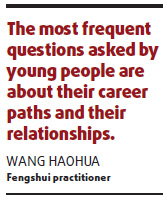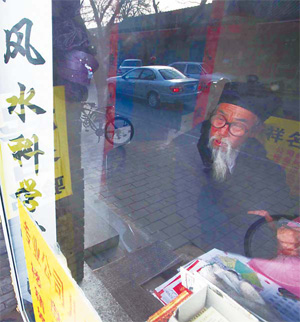The popular magic of 'wind and water'
As 2010 dawns, the turning of a decade gives people a great opportunity to get their affairs in order - and for some, fengshui too.
The streets to the west of Yonghegong, or Lama Temple, are lined with shops selling new fengshui calendars and books, along with the usual incense. And traders say it is not just elderly people snapping them up.
"We get all kinds of customers here," said a shopkeeper surnamed Wang, who has the exclusive rights to sell fengshui calendars whose covers sport a smiling Li Juming, a Hong Kong practitioner.
"Young tourists are always buying calendars for themselves or their parents."
|
A fengshui practitioner waits for customers at a shop near the Lama Temple. Wang Jing |
The peak time for sales is the Spring Festival. The trader said she will buy in a large amount of stock for the rush.
Fengshui is gaining interest among young people in China. An online survey of about 600 people conducted by METRO on social networking website Renren.com last week found that around 70 percent said they, more or less, believe in fengshui.
Pang Bo, a 24-year-old university student in Beijing, is a believer despite an education background of computer science.
Pang thinks fengshui arrangements of interior design helps visitors feel comfortable.
Pang said he felt uneasy when he stepped into a hotel room he had booked in Shenzhen, Guangdong province, last month.
"It was the interior decoration," he said. "The dressing mirror on the wall faced the bed, which made me feel uncomfortable."
But some of his friends said Pang was superstitious.
Pang admitted that most of the time he didn't know how to explain it.
Wang Haohua, a fengshui practitioner in Beijing, told METRO that young people, especially white-collar workers, are now his biggest clients, along with executives with large enterprises.
"The most frequent questions asked by young people are about their career paths and their relationships," Wang said.
Wang said fengshui, which translates as "wind water", is a set of knowledge that people use to improve their living environment in ancient China. Fengshui knowledge could be dated back to 3,000 years ago.
He said it still cannot be explained by science but that does not mean it is wrong.
"It is just like traditional Chinese medicine; sometimes difficult to illustrate but effective," he said.
Wang added that there were also people who followed the advice of fengshui masters just for psychological comfort.
Zhang Xixi, 23, is a Beijing office worker born in the year of the tiger.
As 2010 sees the return of the tiger, Zhang said she was told by a fengshui practitioner to visit a temple to avoid bad luck.
"I don't know much about fengshui but after going to the temple I feel safe and comfortable about the new year," she told METRO. "Everyone needs good luck, right?"

Although fengshui has enjoyed somewhat of a comeback across the world in recent years, the argument between science and superstition has raged for decades.
In late 2008, the University of Science and Technology in Wuhan, Hubei province, offered a course covering the "architecture of fengshui".
However, it was cancelled after criticism on campus and in the media.
Tao Shilong, a famous geologist in his 80s, said fengshui is superstition in an article posted online.
"For me, a fengshui practitioner is no different from a fortuneteller or palm reader," said one college student on an online forum.
Hou Wenxia, who opened a consultancy firm close to the Confucius Temple, said it is hard to reason with.
"It is not easy for young people to understand its philosophical foundation," he said. "Fengshui is closely associated with ancient Chinese culture and philosophy.
"Some people say it is superstitious. I think at its core, fengshui calls for harmony between human beings and nature."
(China Daily 01/04/2010 page28)













